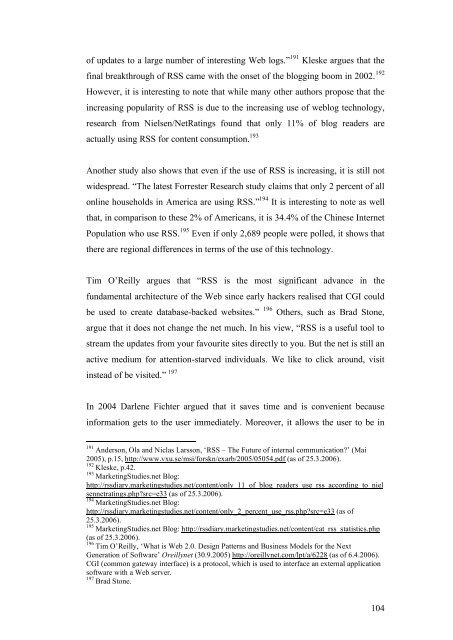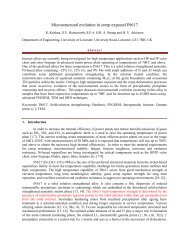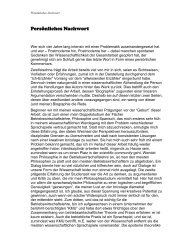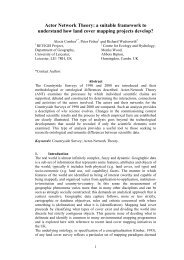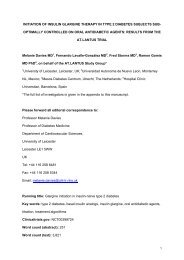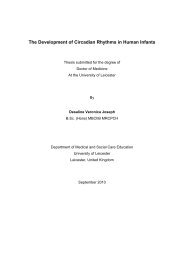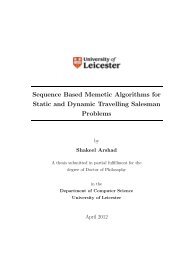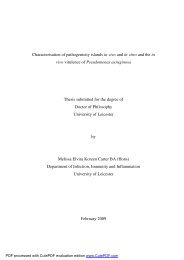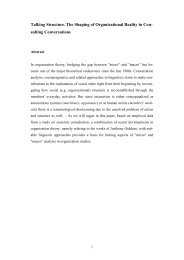5 Case Study 1 - Leicester Research Archive - University of Leicester
5 Case Study 1 - Leicester Research Archive - University of Leicester
5 Case Study 1 - Leicester Research Archive - University of Leicester
You also want an ePaper? Increase the reach of your titles
YUMPU automatically turns print PDFs into web optimized ePapers that Google loves.
<strong>of</strong> updates to a large number <strong>of</strong> interesting Web logs.” 191 Kleske argues that the<br />
final breakthrough <strong>of</strong> RSS came with the onset <strong>of</strong> the blogging boom in 2002. 192<br />
However, it is interesting to note that while many other authors propose that the<br />
increasing popularity <strong>of</strong> RSS is due to the increasing use <strong>of</strong> weblog technology,<br />
research from Nielsen/NetRatings found that only 11% <strong>of</strong> blog readers are<br />
actually using RSS for content consumption. 193<br />
Another study also shows that even if the use <strong>of</strong> RSS is increasing, it is still not<br />
widespread. “The latest Forrester <strong>Research</strong> study claims that only 2 percent <strong>of</strong> all<br />
online households in America are using RSS.” 194 It is interesting to note as well<br />
that, in comparison to these 2% <strong>of</strong> Americans, it is 34.4% <strong>of</strong> the Chinese Internet<br />
Population who use RSS. 195 Even if only 2,689 people were polled, it shows that<br />
there are regional differences in terms <strong>of</strong> the use <strong>of</strong> this technology.<br />
Tim O’Reilly argues that “RSS is the most significant advance in the<br />
fundamental architecture <strong>of</strong> the Web since early hackers realised that CGI could<br />
be used to create database-backed websites.” 196 Others, such as Brad Stone,<br />
argue that it does not change the net much. In his view, “RSS is a useful tool to<br />
stream the updates from your favourite sites directly to you. But the net is still an<br />
active medium for attention-starved individuals. We like to click around, visit<br />
instead <strong>of</strong> be visited.” 197<br />
In 2004 Darlene Fichter argued that it saves time and is convenient because<br />
information gets to the user immediately. Moreover, it allows the user to be in<br />
191 Anderson, Ola and Niclas Larsson, ‘RSS – The Future <strong>of</strong> internal communication?’ (Mai<br />
2005), p.15, http://www.vxu.se/msi/forskn/exarb/2005/05054.pdf (as <strong>of</strong> 25.3.2006).<br />
192 Kleske, p.42.<br />
193 MarketingStudies.net Blog:<br />
http://rssdiary.marketingstudies.net/content/only_11_<strong>of</strong>_blog_readers_use_rss_according_to_niel<br />
sennetratings.php?src=e33 (as <strong>of</strong> 25.3.2006).<br />
194 MarketingStudies.net Blog:<br />
http://rssdiary.marketingstudies.net/content/only_2_percent_use_rss.php?src=e33 (as <strong>of</strong><br />
25.3.2006).<br />
195 MarketingStudies.net Blog: http://rssdiary.marketingstudies.net/content/cat_rss_statistics.php<br />
(as <strong>of</strong> 25.3.2006).<br />
196 Tim O’Reilly, ‘What is Web 2.0. Design Patterns and Business Models for the Next<br />
Generation <strong>of</strong> S<strong>of</strong>tware’ Oreillynet (30.9.2005) http://oreillynet.com/lpt/a/6228 (as <strong>of</strong> 6.4.2006).<br />
CGI (common gateway interface) is a protocol, which is used to interface an external application<br />
s<strong>of</strong>tware with a Web server.<br />
197 Brad Stone.<br />
104


